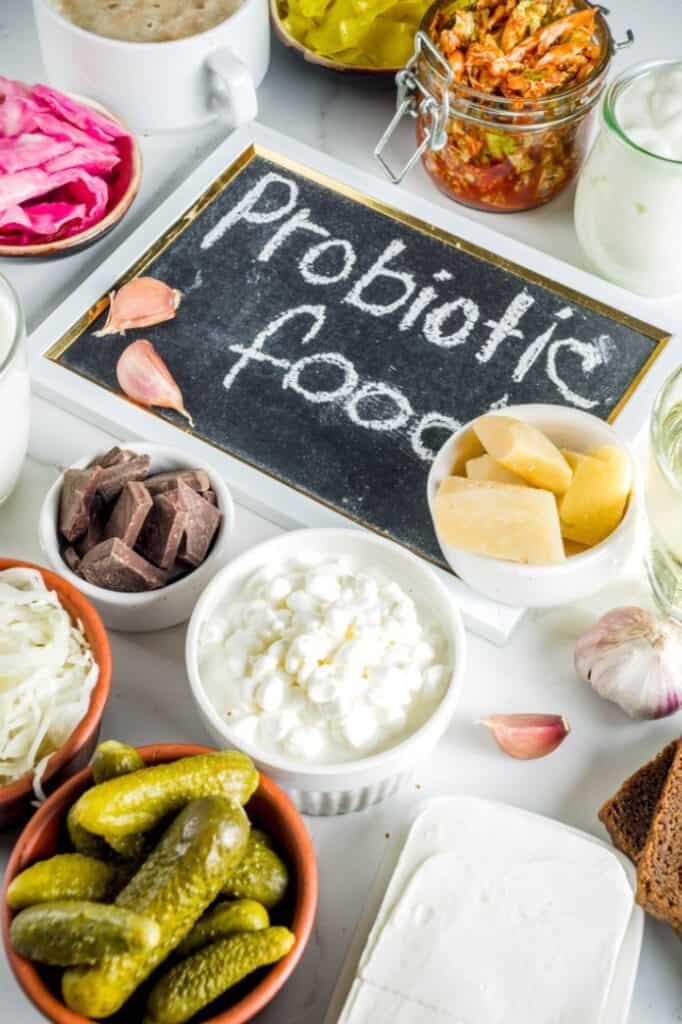Suffering from the unpredictable symptoms of irritable bowel syndrome such as abdominal pain, bloating, and constipation can be frustrating and challenging. However, natural remedies such as fermented foods can help alleviate symptoms and promote better gut health.
In this article, we explore the research-backed benefits of kimchi and sauerkraut to take control of your IBS symptoms and enjoy a more regular lifestyle.

Are you suffering from abdominal pain, bloating, or constipation?
The unpredictable nature of these symptoms, common with irritable bowel syndrome, or IBS, can make it difficult to maintain a regular lifestyle.
Fortunately, there are natural remedies available that can help alleviate IBS symptoms.
Two such remedies are kimchi and sauerkraut, fermented foods that have been used for centuries to aid digestion and promote overall health.
In this article, I explore the benefits of kimchi and sauerkraut and how they can improve gut health, reduce inflammation, and ease IBS symptoms.
So, let’s dive in and discover the research that was done on these two fermented foods and how they can support you in your journey to better gut health.
What is IBS?
Irritable bowel syndrome (IBS) is a condition that affects many people’s digestive system. It causes recurring pain and discomfort in the abdomen, bloating, and changes in bowel movements, like diarrhea or constipation.
IBS is a common condition, affecting millions of people in the US alone. It’s estimated that around 1 in 10 to 1 in 7 people worldwide have IBS.
The Importance of Gut Health
Gut health is important for managing IBS because the gut is responsible for digesting food, absorbing nutrients, and eliminating waste from the body.
The gut is also home to trillions of microorganisms, collectively known as the gut microbiome, which play an important role in maintaining gut health and regulating the immune system.
Research has shown that people with IBS may have an altered gut microbiome, with a decrease in beneficial bacteria and an increase in harmful bacteria. This can lead to inflammation and irritation of the gut lining, which can worsen IBS symptoms.
Probiotics, which are beneficial bacteria that can be consumed through supplements or fermented foods, may also help to improve gut health.
Fermented Foods for IBS
Kimchi and sauerkraut are examples of fermented foods that research shows are effective for improved gut health.
Kimchi is a traditional Korean dish that consists of fermented vegetables, most commonly Napa cabbage or Korean radish, seasoned with a variety of spices such as chili flakes, garlic, ginger, and scallions.
The mixture is then allowed to ferment for a period of time, typically several days to weeks, which results in a tangy, sour, and spicy flavor. Kimchi is a popular side dish in Korean cuisine and is often served with rice or used as a condiment in sandwiches, salads, and other dishes. It is also considered a source of probiotics, which can promote gut health.
Sauerkraut is a fermented cabbage dish that has been consumed for centuries, particularly in Central and Eastern Europe. It is made by shredding cabbage and mixing it with salt and other seasonings, then allowing it to ferment naturally.
During the fermentation process, beneficial bacteria present in the cabbage convert the natural sugars in the cabbage into lactic acid, which gives the sauerkraut its distinctive sour flavor and helps to preserve it.
Sauerkraut is a rich source of vitamins C and K, as well as fiber, and is often used as a condiment or side dish to complement a variety of savory dishes. It is also known for its potential health benefits, including improved digestion, reduced inflammation, and enhanced immune function.
Other examples of fermented foods include yogurt, pickles, miso, kombucha, and kefir.
Study on the Impact of Kimchi Consumption on IBS
The 2022 study titled “Kimchi improves irritable bowel syndrome: results of a randomized, double-blind placebo-controlled study” aimed to investigate the potential therapeutic effects of consuming kimchi, a traditional Korean fermented food, on symptoms of IBS.
The researchers conducted a randomized, double-blind, placebo-controlled study with 90 participants diagnosed with IBS. Food intake records, serum levels of inflammatory factors, fecal levels of harmful enzymes, and microbiome changes were investigated over the 12-week study period.
The study found that participants who consumed kimchi experienced significant improvements in IBS symptoms, including abdominal pain, bloating, and stool consistency, compared to the placebo group. Additionally, the participants in the kimchi group had improved quality of life and decreased levels of anxiety and depression.
The researchers concluded that the consumption of kimchi may be an effective dietary intervention for managing symptoms of IBS. They suggested that the beneficial effects of kimchi may be due to its probiotic properties, which can improve gut microbiota and reduce inflammation in the gut.
Study on the Impact of Sauerkraut Consumption on IBS
The 2018 study titled “The effect of sauerkraut consumption on symptoms of irritable bowel syndrome: A randomized, double-blind, placebo-controlled crossover study” aimed to investigate whether daily consumption of sauerkraut can improve symptoms of Irritable Bowel Syndrome.
The study involved 24 participants who had been diagnosed with IBS and who had reported symptoms for at least six months. Each participant received both the sauerkraut and the placebo (in this case, pasteurized sauerkraut) in random order, and neither the participants nor the researchers knew which one they were consuming at any given time.
The participants consumed either sauerkraut or a placebo daily for four weeks, followed by a two-week washout period, after which they switched to the other intervention for another four weeks.
The study found that the consumption of sauerkraut significantly reduced the severity of IBS symptoms such as abdominal pain, bloating, and constipation, compared to the placebo. The study also found that the consumption of sauerkraut increased the abundance of certain beneficial bacteria in the participants’ gut microbiome.
The authors concluded that sauerkraut may be a promising dietary intervention for people with IBS, but further research is needed to confirm these findings and to optimize the dose and duration of treatment.
Why Fermented Foods Improve Gut Health
Fermented foods, like kimchi and sauerkraut, can improve gut health. This is because they:
Contain Probiotics
Fermented foods may benefit people with Irritable Bowel Syndrome (IBS) in several ways.
One of the primary benefits of fermented foods is that they contain beneficial bacteria, also known as probiotics, that can help improve gut health. People with IBS often have imbalances in their gut microbiome, which can contribute to symptoms like bloating, abdominal pain, and diarrhea. The probiotics in fermented foods can help restore the balance of the gut microbiome, reducing these symptoms.
Are Easier to Digest
Additionally, the fermentation process can break down complex carbohydrates and other compounds in the food that may be difficult to digest for people with IBS. This can make the food easier to digest and may reduce symptoms like bloating and gas.
Reduce Inflammation
Fermented foods may also have anti-inflammatory effects on the gut, reducing inflammation and alleviating symptoms of IBS.
Some Fermented Foods to Try

Here are some suggestions for fermented foods rich in probiotics to add to your diet for improved gut health:
Yogurt. Yogurt that contains live and active cultures of beneficial bacteria, such as Lactobacillus and Bifidobacterium, can help improve gut health and alleviate symptoms of IBS. Be aware, however, that for some people, however, the lactose in yogurt can trigger a flare-up.
Kefir. Kefir is a fermented drink made from milk that contains a variety of beneficial probiotic strains. It has been shown to help improve symptoms of IBS, such as bloating and constipation.
Sauerkraut. Sauerkraut is a fermented cabbage dish that contains probiotic bacteria and enzymes that can improve digestion and reduce inflammation in the gut.
Kimchi. Kimchi is a Korean fermented vegetable dish that contains a variety of beneficial probiotic strains. It has been shown to reduce symptoms of IBS and improve gut health.
Kombucha. Kombucha is a fermented tea drink that contains beneficial bacteria and yeast. It can help improve gut health and reduce inflammation in the gut.
Miso. Miso is a fermented soybean paste that contains probiotic bacteria and enzymes. It can help improve digestion and reduce inflammation in the gut.
It is important to note that while fermented foods can benefit some individuals with IBS, they may exacerbate symptoms for others. It is best to introduce these foods slowly and in small amounts to determine if they are well-tolerated.
Whether or not kimchi and sauerkraut are okay for someone with IBS will depend on their individual tolerance for high FODMAP foods. Sauerkraut is a high FODMAP food. Start slowly and observe symptoms.
Both the kimchi and sauerkraut studies showed improvement in symptoms of IBS suffers.
Additionally, it is important to consult with a healthcare provider before making any significant dietary changes, especially if you have any concerns about food sensitivities or allergies.
How to Add Fermented Foods to Your Diet
Adding fermented foods to your diet can be a great way to support gut health and boost your intake of beneficial probiotics. Here are some tips for incorporating fermented foods into your diet:
Start small. If you’re new to fermented foods, start by adding small amounts to your meals to see how your body responds. You can gradually increase your intake over time.
Choose quality products. Look for high-quality fermented foods, such as unpasteurized sauerkraut, kimchi, kefir, yogurt and kombucha. These products contain live and active cultures that can provide the greatest health benefits.
Experiment with flavors. Fermented foods come in a wide range of flavors and textures, so try different types to find the ones you enjoy the most. For example, you might prefer the spicy flavor of kimchi or the tangy taste of kefir.
Add fermented foods to meals. You can incorporate fermented foods into your meals in a variety of ways. For example, you might add sauerkraut to a salad or sandwich, just eat it off the fork, or top yogurt with fresh fruit and nuts.
Make your own fermented foods. If you’re feeling adventurous, you can try making your own fermented foods at home. This can be a fun and rewarding way to experiment with different flavors and textures, and it allows you to control the quality of the ingredients and the fermentation process.
Remember, everyone’s digestive system is different, so it’s important to pay attention to how your body responds to fermented foods and adjust your intake accordingly.
FAQs About Fermented Foods and IBS
Fermented foods contain a lot of beneficial bacteria that your digestive system may take time to get used to. Take 2-3 weeks to introduce sauerkraut into your diet.
If this is your first time eating sauerkraut, start slowly sipping just a bit of the brine for the first week. Then eat a few strands of the sauerkraut for the second week, working up to 1-2 tablespoons (20-30 grams) 1-2 times a day during the third week.
Fermented foods can potentially trigger symptoms in people with IBS as they can be high in histamine, which is a compound that can cause inflammation and irritation in the gut.
Additionally, some fermented foods may contain FODMAPs (fermentable oligosaccharides, disaccharides, monosaccharides, and polyols), which are types of carbohydrates that can be difficult for some people with IBS to digest.
If FODMAPS are difficult to digest, choose fermented, or make your own red cabbage sauerkraut, which is less likely to have FODMAPs.
Support Your Gut Health with Fermented Foods
Fermented foods can be a great way to support a healthy gut and improve symptoms of IBS. If you’re new to fermented foods, start by adding small amounts to your meals to see how your body responds.




 This post may contain affiliate links which won’t change your price but will share some commission.
This post may contain affiliate links which won’t change your price but will share some commission.




